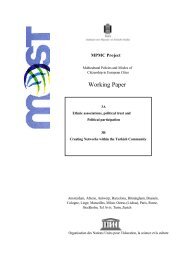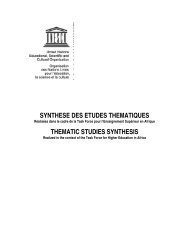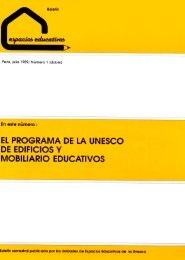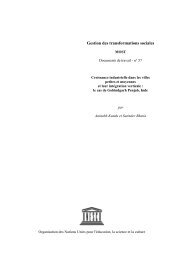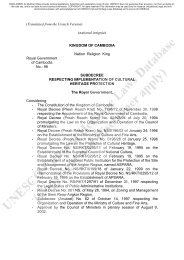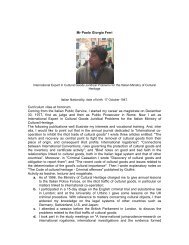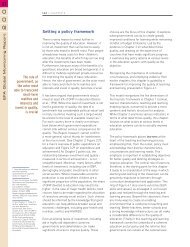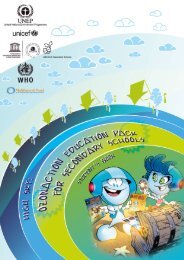Chapter 2. Progress towards the EFA goals - Unesco
Chapter 2. Progress towards the EFA goals - Unesco
Chapter 2. Progress towards the EFA goals - Unesco
Create successful ePaper yourself
Turn your PDF publications into a flip-book with our unique Google optimized e-Paper software.
0<br />
1<br />
2<br />
0<br />
CHAPTER 2<br />
Education for All Global Monitoring Report<br />
Initial training and professional development<br />
are also crucial to morale and effective teaching.<br />
Teachers are <strong>the</strong> product of <strong>the</strong> education systems<br />
<strong>the</strong>y teach in. Where <strong>the</strong>se systems are of low<br />
quality it is even more important for teachers to<br />
receive effective training and support throughout<br />
<strong>the</strong>ir careers. Teachers need to understand <strong>the</strong><br />
content of <strong>the</strong> curriculum and be able to<br />
communicate it to students of varying ability. In<br />
many countries, initial training is not good enough<br />
to develop <strong>the</strong>se skills. To make matters worse,<br />
many teachers do not even receive initial training.<br />
In Mozambique, one recent evaluation found that<br />
41% of primary school teachers were untrained<br />
(Mulkeen and Chen, 2008). In-service training,<br />
which is vital to build on initial skills, is also<br />
poorly developed in many low-income countries<br />
(Leu, 2004; Lewin and Stuart, 2003).<br />
Conclusion<br />
The ultimate aim of schools is to equip children<br />
with <strong>the</strong> skills and knowledge <strong>the</strong>y need to realize<br />
<strong>the</strong>ir potential, develop secure livelihoods and<br />
participate in society. Evidence presented in this<br />
section suggests that many schools are failing to<br />
meet even minimum standards for <strong>the</strong> quality of<br />
education. Millions of children, especially those<br />
from socially marginalized groups, are completing<br />
<strong>the</strong>ir primary education without having acquired<br />
basic literacy and numeracy skills. At <strong>the</strong> secondary<br />
level, too, many education systems in developing<br />
countries are characterized by low levels of<br />
learning and high levels of inequality. Equipping<br />
schools to provide good quality education will<br />
require governments to focus more strongly on<br />
recruiting and training teachers, supplying<br />
textbooks and developing classroom practices<br />
that promote active learning. Support for literacy<br />
and reading in early grades has an especially<br />
important role to play, as <strong>the</strong>se skills create<br />
<strong>the</strong> foundation for future learning.<br />
118



